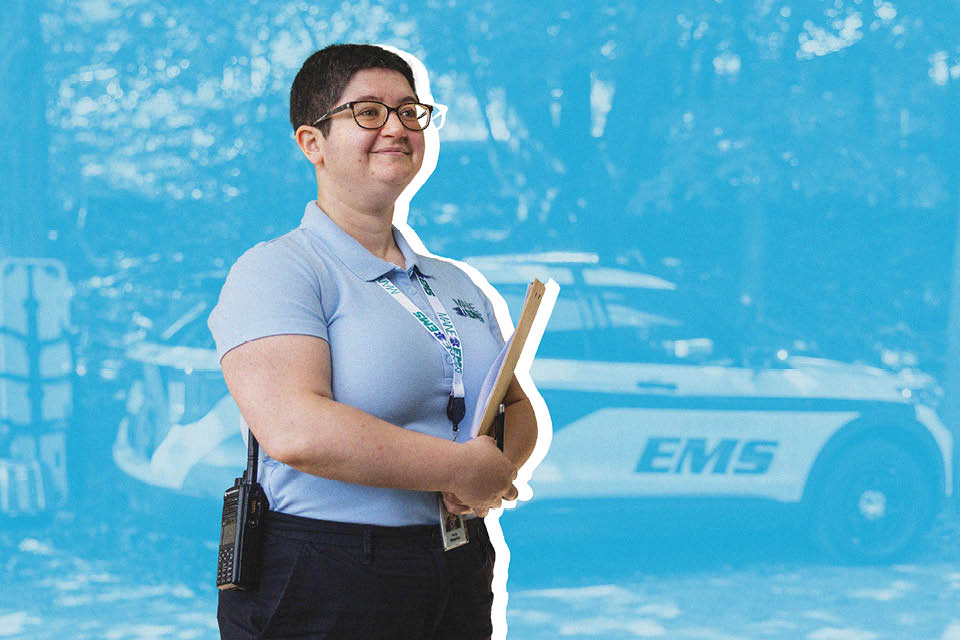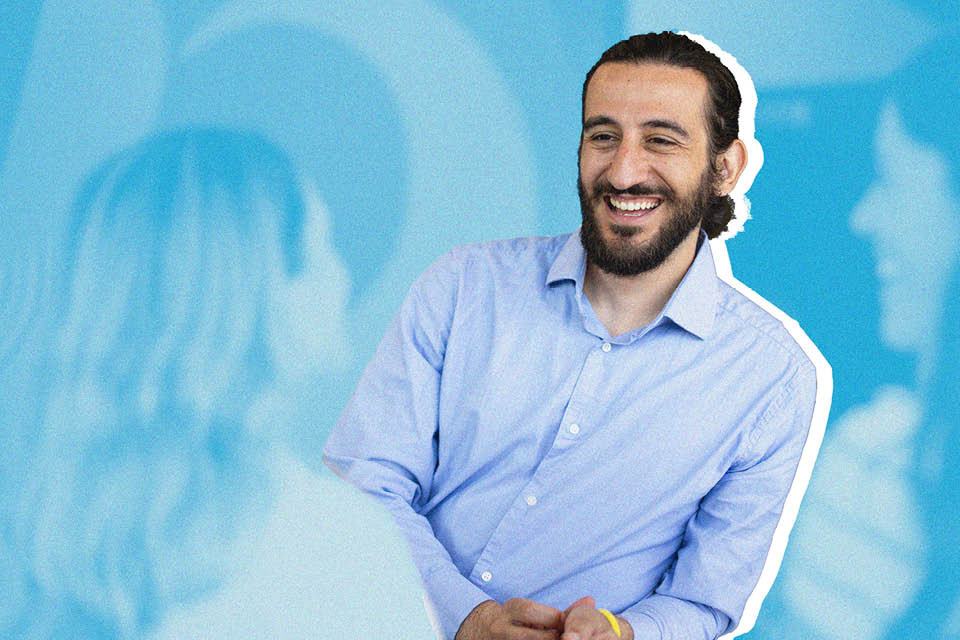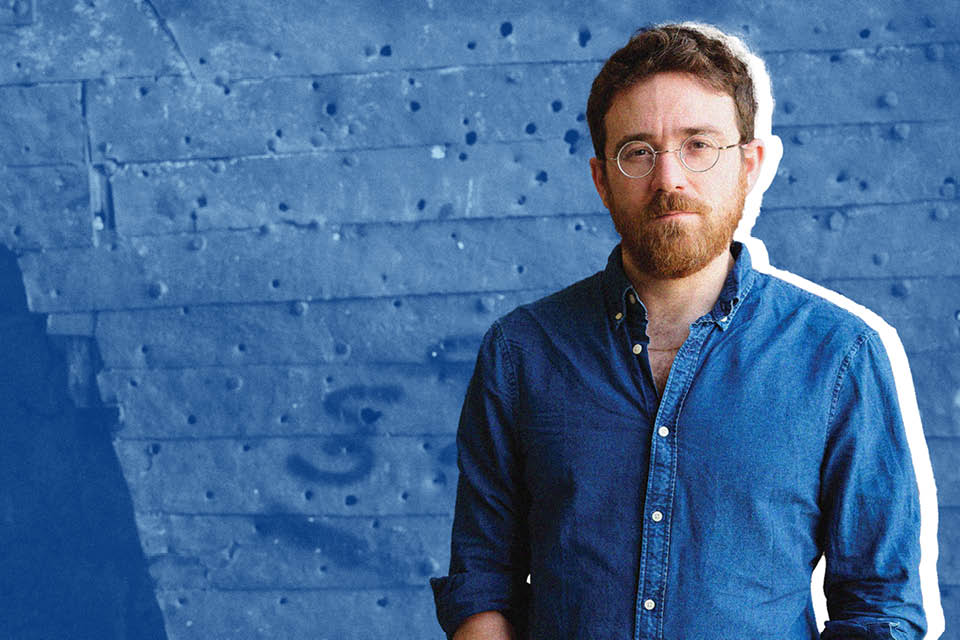Anna Massefski ’17
As coordinator of Maine’s EMS Explorer Program, Anna Massefski ’17 is spearheading the statewide effort to inspire people to pursue emergency medical services (EMS) as a career path.
The hope, she says, is to both equip people with lifesaving skills, and give them a clearer understanding of what a career in the field would look like. Coordinated by the state and led by Massefski, the program works by connecting students at partnering schools with their local emergency services personnel, then providing mentorship, training, and an opportunity to engage with the public safety and healthcare partners in their community. Students gain leadership and communication skills, while also becoming certified in CPR and first aid.
Expand All
I was hired in 2022 and before me, there was no Explorer Program. When I started, it was really: “Here's this idea we have. Go make it happen.” Over the last year and a half, I've been working to create the program from scratch, identifying and working with community partners, and figuring out how it works best. Our hope is for people across Maine to learn about emergency medical services, to connect with their local service providers, and think about whether this is a career that might work for them. We want to make sure people have the opportunity to make an informed choice before pursuing a more formal education.
My role is really oversight and development. I am responsible for teaching participants, but also for helping to implement the program across the state. For example, if an EMS agency is interested in starting up a program for themselves, I help them do that. These providers then go to their local schools, their community partners, and teach their students directly. So on top of delivering training, my role is about empowering the agencies to get out into their community. And we're currently developing an implementation guide to make that process easier.
Right now, we're focusing on high schoolers, because they’re at a critical point where they’re thinking about college and what they might want to do as a career. But we do want to expand it to older age groups. I want it to be something for anybody considering EMS as a career, or even as a volunteer opportunity.
It's funny, I never thought of EMS as a career path until coming to Brandeis. I was a transfer student, majoring in film and writing. I had in the back of my mind, though, that I wanted a plan B. Then one day, walking to the dining hall, I heard a loud smack. Another student had fallen and hit her head. She was bleeding, freaking out, and I didn't really know how to handle it. The BEMCO EMTs (Brandeis’ student-run volunteer emergency medical service) arrived and immediately calmed her down and handled the situation. I thought: “I want to know how to do that.” So the next semester, I took an Emergency Medical Technician (EMT) class Brandeis offered. After graduating, I got licensed as an EMT.
It's important that people understand what they're getting into, because what you see on TV and in movies isn't really what EMS is about. For me, EMS is about being there for someone on their worst day. The calls where I really felt like I made a difference were the ones where all I could do was be a compassionate advocate, listening to a patient’s problem, and maybe making them feel a little better. But if I had gone into EMS wanting that hot-blooded action that people think of, I would have been badly disappointed. That’s why there are a lot of people who start an EMT class that don't finish, or finish but don't get licensed. I want to help people better understand what this work entails before they make a serious commitment to it.
With the implementation guide we’re developing, our hope is for EMS agencies to run with it themselves. I want this to be something that grows and becomes accessible to agencies across Maine, and even across the country. I believe people are their own changemakers, so I see my role here as empowering agencies, teachers, students, and EMTs to think about what’s right for them, and then to go for it.
Eric Moyal ’17, MA’18, MS’22
Eric Moyal ’17, MA’18, MS’22, is on a mission to rein in the exorbitant cost of insulin.
Currently, more than a million people who rely on insulin, which is essential to the treatment of diabetes, ration their supply. That means they take less than they need because they simply can’t afford it.
In 2022, Moyal founded the nonprofit Project Insulin to combat this problem by creating a generic insulin to be sold at cost to patients, regardless of their insurance status.
Expand All
Currently more than eight million people in the United States use insulin, and about 1.3 million ration their monthly supply, which means they don't take as much as they need. This leads to long-term lasting effects on their bodies, their health, and on their families. In addition, there are many others who have to sacrifice things like higher education, food, and even career opportunities, because they can't afford their insurance, or to pay for both the high price of insulin and for these other things.
By addressing unaffordability and inaccessibility. We’re creating our own insulin, which we can sell at whatever price we want. All of our competitors are for-profit organizations, and they have a fiduciary duty to make as much money as they can for their shareholders. As a nonprofit, we don't have that kind of pressure. By being vertically integrated, we’ll cut out the many middlemen organizations, like wholesalers, who help drive up the costs. We'll also be partnering with federal and local healthcare clinics around the country to distribute the insulin directly to where patients are already going.
My little sister has a rare chronic illness (Complex Regional Pain Syndrome), and I've been raising money and awareness for that illness for years now. Over time, though, I realized that fundraising isn't the main issue with her illness. There's still a lot of scientific research that needs to be done, there are no treatments or cures yet for her illness. So I didn't feel like I was having as much of a tangible impact as I wanted. Then in 2020, I met my partner who has Type-1 diabetes, and she told me about insulin and how expensive it is. I realized that making insulin affordable is not a scientific problem but a money problem, and as a professional fundraiser, I can solve a money problem.
They vary relative to where we’ve been and where we are now. Getting our 501(c)(3) nonprofit status was a really big achievement. But every chapter has felt significant. We first launched Project Insulin in a Brandeis incubator called Spark Tank – which provides pilot funding for social-minded projects – and we won $2,500 there. We've since had various $50,000 grants come in, each one more exciting than the last. And it’s been amazing fielding proposals from drug developers who want to help. That was really important to us, as it provided us with validation from the life sciences/pharma community. And something I’m really proud of is just how many people have helped: volunteers, mentors, advisors, patients doing informational interviews.
In the next few months , we will start drug development, which is monumental for us. For the last two and a half years, we’ve been learning about drug development, about insulin, and supply issues in the U.S. and abroad. We’ve learned who the players are, and who could potentially help us develop our insulin. Getting to the point where we can actually create insulin – so we're no longer just talking about it, but doing it – that's what we're most excited about in the near future.
Natan Odenheimer ’15
Late last year, Natan Odenheimer ’15, a freelance journalist with The New York Times' Jerusalem bureau, co-wrote an article entitled “The Day Hamas Came”. The story is an hour-by-hour account of Hamas’ October 7 attack on one especially hard-hit Israeli village.
A week later, The Times published another story co-written by Odenheimer, this one titled “Where Was the Israeli Military?” The piece details a “disorganized” response by Israel to the initial attack, after which Israel launched the war.
Both stories were among seven submitted by The New York Times that earned the newspaper the Pulitzer Prize in International Reporting in May.
Expand All
Our goal is to give English speaking readers access to understanding what happened on October 7th, and also in the war that Israel carries out, in response. As journalists, we want to understand why things happen, how dramatic events unfold, and to tell the personal human stories behind these big events. Yet we must also maintain a line of inquiry that is uncompromising in trying to understand the truth.
I recently watched a master class with Bob Woodward, one of the two journalists who broke the Watergate story for the Washington Post in 1972. He said journalists shouldn't think too much about the impact of their stories. That doesn't mean we shouldn't hope our stories have an impact. Rather, let's say we’re reporting on someone who's corrupt in an important position. Our job as journalists isn't to make sure that person is kicked out of their job. Our job is to expose wrongdoings, and the rest should happen, not on its own, but by other people. I wouldn't want to work on an article thinking: “If I publish this story, this will happen.” I want to believe that if I do my job with high professional ethics, then what we're doing is going to bring some good.
I was born and raised in Jerusalem, and I currently live in Jerusalem. I knew I wanted to become a journalist and a novelist from a very early age. I wrote my first newspaper article when I was 16, in the Jerusalem local newspaper, and over the last ten or 15 years, I’ve been working as a journalist, a columnist, an investigative reporter, and documentary filmmaker. When I was at Brandeis, I was writing opinion pieces and articles for various American and Israeli newspapers, literally writing from our Ziv Quad suite at Brandeis. I also completed a novel when I was at Brandeis that was published in Hebrew in 2016, so right after I graduated. Around that time, I was also deliberating whether I wanted to stay in the United States to pursue advanced degrees or work as a journalist. Ultimately, I felt: “If I want to be a writer, if I want to be a journalist, I want to do it in the place that I care about the most.”
Brandeis was a fantastic, really eye-opening experience. I really learned how to write at Brandeis, and more importantly, how to rewrite and revise.
I also had great professors who taught me how to think and how important it is to really dig deeper, and that things aren't always exactly as we think they are. That there's always other perspectives to consider. I came to Brandeis already with a lot of questions about ethics. That’s why I studied philosophy. Brandeis gave me space to really try to find my own tools to understand and tackle the kinds of dilemmas that I was interested in. That really helped shape my moral compass.




